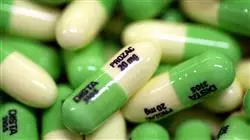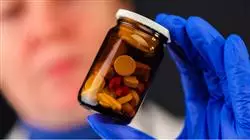University certificate
The world's largest faculty of medicine”
Introduction to the Program
With this Postgraduate diploma you will be up to date with the most advanced procedures in Emergency Therapeutic Management of the Poisoned Patient"

This Postgraduate diploma is necessary for the Physician who is familiar with the fundamentals of Toxicology, since the extension of the program will provide them with a very broad guide of action protocols to solve in a practical way any situation in this area. Although the field of knowledge covered by Toxicology is very broad, the objective of this program is to provide specialists with sufficient knowledge to assess the poisoned patient and address the ideal protocols in each emergency.
This academic space is fundamentally directed to the daily practice of the profession, referring to the study of those toxins that come into contact with patients more frequently, minimizing as much as possible the theoretical foundations of the subject and focusing on the clinical care of the poisoned patient. Through a variety of exemplary real cases, given by the experienced teachers who have been involved in its development.
At the same time, special importance is given to the study of each toxin, so that the physician knows at all times to assess the importance of the patient's condition and to approach their treatment with guaranteed success. The contents of this Postgraduate diploma are structured in 4 large groups of topics with a pedagogical coherence.
Any physician who wants or needs to acquire solid knowledge in Toxicology will find in this program all the material they needs to get up to date in terms of life support, diagnosis and specific treatment of poisoned patients, with an extensive list of complementary aspects that make up the most exclusive teaching load. A complete program, available 100% online and through the most secure, dynamic and intuitive platform, which will allow them to complete it in 6 months or 475 hours of study.
A complete program that covers the medical-legal aspects of toxicological care in the emergency department"
This Postgraduate diploma in Urgent Therapeutic Management of the Poisoned Patient contains the most complete and up-to-date scientific program on the market. The most important features include:
- The development of practical cases presented by experts in Toxicology in the Emergency Room
- The graphic, schematic, and practical contents with which they are created, provide scientific and practical information on the disciplines that are essential for professional practice
- Practical exercises where the self-assessment process can be carried out to improve learning
- Its special emphasis on innovative methodologies
- Theoretical lessons, questions to the expert, debate forums on controversial topics, and individual reflection work
- Content that is accessible from any fixed or portable device with an Internet connection
This program will provide a greater sense of security in the performance of your daily practice"
The program includes in its teaching staff professionals of the field who pour into this training the experience of their work, in addition to recognized specialists from reference societies and prestigious universities.
Its multimedia content, developed with the latest educational technology, will allow the professional a situated and contextual learning, that is, a simulated environment that will provide immersive training programmed to train in real situations.
The design of this program focuses on Problem-Based Learning, in which the professional will have to try to solve the different professional practice situations that will arise throughout the academic course. For this purpose, the student will be assisted by an innovative interactive video system created by renowned experts.
Take the opportunity to learn about the latest advances in Urgent Therapeutic Management of the Poisoned Patient and improve the care of your patients"

The most exclusive and modern online teaching methodology that only TECH can offer you"
Why study at TECH?
TECH is the world’s largest online university. With an impressive catalog of more than 14,000 university programs available in 11 languages, it is positioned as a leader in employability, with a 99% job placement rate. In addition, it relies on an enormous faculty of more than 6,000 professors of the highest international renown.

Study at the world's largest online university and guarantee your professional success. The future starts at TECH”
The world’s best online university according to FORBES
The prestigious Forbes magazine, specialized in business and finance, has highlighted TECH as “the world's best online university” This is what they have recently stated in an article in their digital edition in which they echo the success story of this institution, “thanks to the academic offer it provides, the selection of its teaching staff, and an innovative learning method aimed at educating the professionals of the future”
A revolutionary study method, a cutting-edge faculty and a practical focus: the key to TECH's success.
The most complete study plans on the university scene
TECH offers the most complete study plans on the university scene, with syllabuses that cover fundamental concepts and, at the same time, the main scientific advances in their specific scientific areas. In addition, these programs are continuously being updated to guarantee students the academic vanguard and the most in-demand professional skills. In this way, the university's qualifications provide its graduates with a significant advantage to propel their careers to success.
TECH offers the most comprehensive and intensive study plans on the current university scene.
A world-class teaching staff
TECH's teaching staff is made up of more than 6,000 professors with the highest international recognition. Professors, researchers and top executives of multinational companies, including Isaiah Covington, performance coach of the Boston Celtics; Magda Romanska, principal investigator at Harvard MetaLAB; Ignacio Wistumba, chairman of the department of translational molecular pathology at MD Anderson Cancer Center; and D.W. Pine, creative director of TIME magazine, among others.
Internationally renowned experts, specialized in different branches of Health, Technology, Communication and Business, form part of the TECH faculty.
A unique learning method
TECH is the first university to use Relearning in all its programs. It is the best online learning methodology, accredited with international teaching quality certifications, provided by prestigious educational agencies. In addition, this disruptive educational model is complemented with the “Case Method”, thereby setting up a unique online teaching strategy. Innovative teaching resources are also implemented, including detailed videos, infographics and interactive summaries.
TECH combines Relearning and the Case Method in all its university programs to guarantee excellent theoretical and practical learning, studying whenever and wherever you want.
The world's largest online university
TECH is the world’s largest online university. We are the largest educational institution, with the best and widest online educational catalog, one hundred percent online and covering the vast majority of areas of knowledge. We offer a large selection of our own degrees and accredited online undergraduate and postgraduate degrees. In total, more than 14,000 university degrees, in eleven different languages, make us the largest educational largest in the world.
TECH has the world's most extensive catalog of academic and official programs, available in more than 11 languages.
Google Premier Partner
The American technology giant has awarded TECH the Google Google Premier Partner badge. This award, which is only available to 3% of the world's companies, highlights the efficient, flexible and tailored experience that this university provides to students. The recognition as a Google Premier Partner not only accredits the maximum rigor, performance and investment in TECH's digital infrastructures, but also places this university as one of the world's leading technology companies.
Google has positioned TECH in the top 3% of the world's most important technology companies by awarding it its Google Premier Partner badge.
The official online university of the NBA
TECH is the official online university of the NBA. Thanks to our agreement with the biggest league in basketball, we offer our students exclusive university programs, as well as a wide variety of educational resources focused on the business of the league and other areas of the sports industry. Each program is made up of a uniquely designed syllabus and features exceptional guest hosts: professionals with a distinguished sports background who will offer their expertise on the most relevant topics.
TECH has been selected by the NBA, the world's top basketball league, as its official online university.
The top-rated university by its students
Students have positioned TECH as the world's top-rated university on the main review websites, with a highest rating of 4.9 out of 5, obtained from more than 1,000 reviews. These results consolidate TECH as the benchmark university institution at an international level, reflecting the excellence and positive impact of its educational model.” reflecting the excellence and positive impact of its educational model.”
TECH is the world’s top-rated university by its students.
Leaders in employability
TECH has managed to become the leading university in employability. 99% of its students obtain jobs in the academic field they have studied, within one year of completing any of the university's programs. A similar number achieve immediate career enhancement. All this thanks to a study methodology that bases its effectiveness on the acquisition of practical skills, which are absolutely necessary for professional development.
99% of TECH graduates find a job within a year of completing their studies.
Postgraduate Diploma in Urgent Therapeutic Management of the Poisoned Patient
The emergency therapeutic management of the poisoned patient is a crucial discipline in the field of medicine that focuses on the immediate and effective care of patients who have been exposed to toxic substances. This comprehensive approach seeks to stabilise the patient, minimise the harmful effects of poisoning and prevent serious complications. Would you like to gain the skills necessary to effectively identify and treat patients in acute poisoning situations? You are in the right place. At TECH Global University you will find a complete Postgraduate Diploma that will help you to achieve this goal. Through a 100% online study methodology and with the guidance of our expert teachers, you will learn the fundamental concepts of emergency therapeutic management, mastering rapid assessment techniques, accurate diagnosis and appropriate treatment. In this way, you will learn the tools necessary to understand the mechanisms of toxicity, the main toxic agents and the most common routes of exposure.
End up with a Postgraduate Diploma in Urgent Therapeutic Management of the Intoxicated Patient
This comprehensive TECH program is an investment in your professional future, as it will allow you to differentiate yourself and stand out in the job market. You will obtain a university certificate endorsed by a prestigious institution, which will allow you to access new job opportunities. You will also have the flexibility and convenience of an online program that will allow you to adapt your learning to your needs and schedule. Here, we have ensured that we have a team of professional experts in the field, who will teach the classes online, offering an interactive and enriching learning experience. In addition, the program includes case studies and exercises that will allow you to apply the knowledge acquired in real situations, which will help you to consolidate and consolidate your academic preparation. Upon graduation, you will master the latest research in the field of toxicology, which will allow you to keep abreast of the most recent advances in the diagnosis and treatment of poisoning. For all this and more, we are your best educational choice - decide to enrol now!







